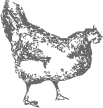
A sorry tale today, but one with a happy ending attached. It’s no news that battery hens are kept in horrible conditions with barely the space to turn round and nothing to do but pull each others feathers out. But the story of what happens to these unlucky hens next is less well publicised. Battery hens are hybrids, bred to lay, and most battery hens can lay an egg a day for their first year (after reaching maturity). In their second year that decreases to more like 270 eggs in the year. In intensive farming terms this is just not efficient enough and most battery hens are sent to slaughter at around a year old. They’re not particularly tasty or well nourished so they end up in dog food or stock.
In our current economic climate farmers are having to keep hens for longer than normal before they can afford to replace them with new. I can’t get my mind round which situation is worse for the hens: die early or have an extended stay in detestable, miserable conditions. But hey, I said this was a tale with a happy ending. Four weeks ago Eva, Henrietta and Gloria retired from the battery cage and came to live with us in veritable chicken luxury.
 Picking our three girls up on rescue day was rather more of an emotional rollercoaster than I had been expecting. Five hundred stressed, neglected hens is a harrowing sight but the remarkable folk at the Battery Hen Welfare Trust had new owners queing out of the yard and down the lane to whisk all five hundred hens off to happy new homes.
Picking our three girls up on rescue day was rather more of an emotional rollercoaster than I had been expecting. Five hundred stressed, neglected hens is a harrowing sight but the remarkable folk at the Battery Hen Welfare Trust had new owners queing out of the yard and down the lane to whisk all five hundred hens off to happy new homes.
Our three lovelies are in varying degrees of featheriness. Henrietta appears to be a normal hen (until you pick her up and see her poor little bald tum). Gloria is clothed primarily in her white underfeathers. Poor Eva has had her neck and shoulders so badly pecked that she looks positively oven-ready.

While Nik and I have been learning all about henny behaviour over the past weeks so have Eva, Gloria and Henrietta . How do you explain to a hen that has never had an “outside” or a nesting box all about going to bed and laying your eggs in the right place? Happily they’re fast learners and all three already know how to take themselves off to bed at dusk and how to help themselves to the kale in my vegetable plot. Henrietta has even taught herself how to make a dustbath by relieving a hollow in our lawn of its grass. Oh and there’s an added bonus too; we’re currently averaging two tasty garden-fresh eggs every day.
Find out more about chicken welfare and adopting your own
Battery hen welfare trust information for consumers
Battery hen welfare trust information potential hen adopters
Compassion in world farming poultry pages
Animals Australia Free Betty campaign

 Come join me on Twitter
Come join me on Twitter Sophie Roberts is a registered dietitian based in Oxford, UK. She loves combining her nutrition know-how with a sustainable approach to buying and preparing food and shares her tips and recipes here at Mostly Eating.
Sophie Roberts is a registered dietitian based in Oxford, UK. She loves combining her nutrition know-how with a sustainable approach to buying and preparing food and shares her tips and recipes here at Mostly Eating. 
{ 23 comments }
I love our hens (which were bought from a local, rather than so admirably rescued as yours were). Not only are the eggs superior to any I have ever had, they’re lovely little creatures to observe and the kids love them too.
Oh this is such a good story Sophie. I’ve been wondering about your battery rescues, I thought it might be because they weren’t laying quite so intensively. What a good job the Battery Hen Welfare Trust do.
And I’m also very happy to hear their innate henny behaviours are coming out, with the space and freedom.
What an awesome thing to do!! Today for the first time i bought free range eggs at the supermarket and i’ll happily handover extra money if it will help the chickens have a better life!!
A very happy ending — lucky chicks. Thank you for informing us about the back story, difficult as it is to hear and think about. Knowing the facts can help is make the ethical, humane choice about what we eat.
What a wonderful post. It’s great to read that all 500 hens found new homes. Hope the girls will recover quickly.
Oh, I’ve been dying to see photos of the hens! They look so happy in their new environment. I’m so pleased for them and for you!
there is something really lovely about chickens in the backyard – feels so homely in the best sort of way – but 2 eggs a day is a lot to get through – I’d have to give some away – which is no bad thing!
Oh the poor things do look the worse for wear. You’ll have to show us some photos when they get their feathers back. It’s marvellous that you’ve given them a new life, and brilliant they’re producing plenty of eggs.
I think that its wonderful that you came to a rescue for these lovely hens!!
How lovely to get fresh eggs!! Thre is nothing better then that!!
Enjoy!!
I got tears in my eyes after reading this… tears of happiness! I feel so glad for the chickens, hopefully they recover their feathers very soon!
Thank you for this noble deed of yours, Sophie!
What a great post. Here’s to chicken rescue, I think they are forgotten by the ASPCA (or RSPCA I guess in your neck of the woods!)
Oh, fantastic! Your hens are adorable, Sophie- and how great are fresh eggs right in your backyard!? I would love to have hens but I don’t even have a window garden right now, let alone a backyard. One day, though!
Sophie, you not only talk the talk when it comes to improving animal welfare, you well and truly walk the walk. I’m very impressed!
Wonderful! Those are some happy looking chickens. And I’m so happy for them!
So, they just wander about? What do you have to do in terms of chicken care? I ask as it’s something I’d definitely think about in a couple of years.
What a coincidence. Here in my North Yorkshire village of Cowling, my friend Mo has just taken custody of a bunch of hens from the Battery Hen Welfare Trust. Apparently they are discarded when their egg-laying potential falls below the thresholds set by the supermarkets. I’ll be eating some of their delicious eggs soon, now that they have a free-range existence here on the local hillside.
Thanks very much for all of the supportive comments. I promise not to turn this into a chicken blog but will try to post the odd picture to keep you updated about how the girls are getting on.
Wendy – I’ll jot down a few notes about our chicken care routine. They’re super easy to look after and great fun – I can’t recommend them enough
Can’t believe people could do that to something that is so harmless. Even if they aren’t producing like they use to doesn’t mean they should die. This is exactly why I refuse to eat meat. I can not support the murdering of innocent animals.
Thank you for doing your part and helping out poor harmless animals. This is something I wish I’d see more often.
awww … I would love to have chickens in my kitchen…
awww these are sooo cute!! This all reminds me of the book Vegetable Animal Miracle … sound like fun..
I’m glad for those chickens, poor looking hens but now I know they’re well taken care of. Keep it up!
Thanks for a fun and useful site. I’m collecting my first ex-battery ladies on Saturday so it’s great to hear how it was for you. Just hoping it will go well with my rather ‘blonde’ dog Fritz. He will be jealous for a while but hope they can win him over!
Hey! This is kind of off topic but I need some advice from an established blog.
Is it tough to set up your own blog? I’m not very techincal but I can figure
things out pretty fast. I’m thinking about creating my own but I’m not
sure where to start. Do you have any points or suggestions?
Appreciate it